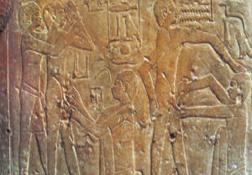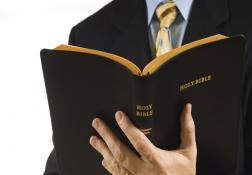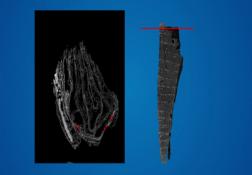You are here
 April 23 2017
The Three-Dimensional Ministry of the Lord Jesus
April 23 2017
The Three-Dimensional Ministry of the Lord Jesus
The range of Jesus' salvific service to humanity is from eternity to eternity. We gasp with awe at the extent of His mercy that commits Him to our rescue from alienation from God to reclamation to God. The mind of the Triune God apart from all else was fixated on restoring fallen man to fellowship with Himself.
Read more April 19 2017
The Return of the Judaizers
April 19 2017
The Return of the Judaizers
Scripture speaks of the circumcision of the heart, an eternal circumcision. In Colossians 2:8-9, 11-14, the Apostle Paul writes:
"See to it that no one takes you captive through philosophy and empty deception, according to the tradition of men, according to the elementary principles of the world, rather than according to Messiah.
For in Him all the fullness of Deity dwells in bodily form.
Read more April 02 2017
PREACHING: SOME OBSERVATIONS AND OPINIONS
April 02 2017
PREACHING: SOME OBSERVATIONS AND OPINIONS
Immediately, it can be perceived, that no individual in themselves is armed with the necessary disposition and capacities to claim fitness for the role of preaching. God must call, God must compel, God must equip, enable, and uphold, and yet no honest preacher feels or believes that he measures up to the demands of his vocation or that his service is anywhere near worthy of his most exalted and merciful Lord.
Read more March 08 2017
God's Sufficient Scripture: A Resource Monograph for The Missionary Diocese of CANA East
March 08 2017
God's Sufficient Scripture: A Resource Monograph for The Missionary Diocese of CANA East
Committed to Scripture's sufficiency, the authors of this monograph have sought to be faithful to the Word of God and thereby faithful to the God of the Word. At places polemical and at places constructive, for the building up of Christ's church in the Missionary Diocese of CANA East, these essays seek to uphold Scripture faithfully by advancing its authoritative truth.
You can read the full monograph here:
http://tinyurl.com/hrj9xpe
 March 01 2017
The Logic of the Lord's Supper in Cranmer's Common Prayer
March 01 2017
The Logic of the Lord's Supper in Cranmer's Common Prayer
"I begin with the observation of another conservative evangelical Anglican with a sympathy for the Prayer Book and Articles, J. I. Packer, that the building block of much Prayer Book liturgy is a triad which he names "sin, grace, faith", but which could perhaps more historically be named "guilt, grace, gratitude", or "repentance, faith, charity".
Read more February 24 2017
ANGLICAN ANEMIA - Conclusion
February 24 2017
ANGLICAN ANEMIA - Conclusion
Anglican piety and proclamation are sensitively geared to human welfare (transient body and eternal soul).
Read more February 15 2017
ANGLICAN ANEMIA -- (Part Four)
February 15 2017
ANGLICAN ANEMIA -- (Part Four)
Anglicanism's godly tradition is virtually trashed. Its contemporary congregants have no idea of what they are missing and probably little appetite for it if ever introduced to it. Our generation has gone too far into a mode of modern Christian thought and practice that flatters and entertains and which bears little resemblance to the historic faith of the ages. It does not adequately reveal the God of sovereignty and majesty nor hold a mirror to the miserable condition of our race.
Read more February 11 2017
ANGLICAN ANEMIA - (Part Three)
February 11 2017
ANGLICAN ANEMIA - (Part Three)
These little hints of individuality and distinctiveness counter our tendency to read all authors in a routine way devoid of empathy. There is music and meaning in great authors who take us into their confidence and society through the privacy of turning the pages of their books, and Ford Lewis Battles describes Calvin as a poet even in the English prose through which we receive him: "We must regard Calvin as a poet because his prose, compared with ours is poetry . .
Read more February 10 2017
Israel: 12th Dead Sea Scroll cave of Qumran discovered
February 10 2017
Israel: 12th Dead Sea Scroll cave of Qumran discovered
The scrolls include biblical texts and Second Temple Period texts, mainly written in Hebrew and Aramaic. They were discovered near Jerusalem in the 1940s by Bedouin goat herders. The scrolls are believed to have been written between 150BC and 70AD. They have been found scattered in several caves in the Qumran area. Some caves have harboured only jars and wrappings of scrolls, but are thought to have also held scrolls at some point in their history.
Best find in 60 years
Read more February 04 2017
ANGLICAN ANEMIA - (Part Two)
February 04 2017
ANGLICAN ANEMIA - (Part Two)
Notwithstanding the excellence of the English Reformers in their knowledge and deployment of Scripture and their grasp of the essentials of the Gospel, Anglicanism is enormously enriched by its numerous connections, formal and informal, with agents of reform on the Continent. The power of friendships between the English and their European confreres should not be underestimated in the formation of religious views.
Read more


